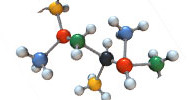
 Categories
Categories  Molecular Biology
Molecular Biology


Proteomics is a scientific field that studies the composition, structure, function, and interactions of all proteins in an organism. Its goal is to establish...

Multiple reaction monitoring (MRM) is a targeted quantitative proteomics research method for target protein. MRM, based on information about the target...

Glycomics refers to the collection, analysis, and utilization of glycosidic biological data at the omics level. The profound biological effects of lipid and...

The fundamental principle of MS-based proteomics is primarily analyzing according to the physicochemical properties of the sample ions, obtaining qualitative...

Dynamic changes in abundance of proteome in cells significantly impact various life processes. For example, the onset and development of many diseases often...

Over recent decades, proteomics driven by mass spectrometry (MS) has emerged as a critical methodology for analyzing protein-protein interactions (PPIs)....

Protein-protein interaction (PPI) refers to the process where two or more protein molecules bind to form a protein complex. Proteins typically do not...

Protein purity and uniformity are crucial for protein crystallization as well as structural and functional studies. Impure samples can lead to inaccurate...

MtoZ Biolabs provides de novo sequencing service for monoclonal antibodies and proteins, with no need for database searching.

Mass spectrometry-based sequence analysis of proteins, antibodies, peptides, and other samples involves the analysis of the sample's amino acid sequence....

MtoZ Biolabs provides comprehensive protein sequencing services to meet various needs of our clients.

Exosomes are extracellular vesicles that play crucial roles in intercellular communication and signal transduction. Exosome sequencing focuses on sequencing...

Amplicon sequencing is a method that sequences specific lengths of PCR-amplified products or captured fragments, primarily using high-throughput sequencing...

Transcriptome sequencing involves sequencing the complete mRNA within cells during specific developmental stages or physiological conditions. This technique...

Eukaryotic transcriptome sequencing can be divided into reference-based and non-reference-based scenarios. Among these, non-reference-based sequencing refers...

The transcriptome is the complete set of mRNA within a cell under specific developmental stages or physiological conditions. Transcriptome sequencing, as a...

16S/18S/ITS full-length sequencing refers to the process of extracting microbial DNA from samples, using universal primers to amplify the full length of the...

Metatranscriptomics, also known as environmental transcriptomics, involves the comprehensive study of gene transcription and regulation within microbial...

The transcriptome is the complete set of transcripts within a cell under specific developmental stages or physiological conditions. The main purpose of...

Post-translational modifications (PTMs) of proteins are covalent processing events occurring to proteins either during or after their translation. The...